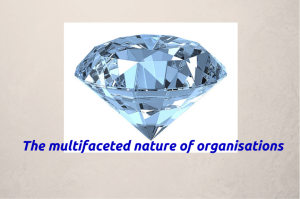 An organisation is like a diamond; both are multifaceted and their characteristics determine their value. In my opinion, the qualities which make a diamond analogous to an organisation are durability, robustness and enduring value. This can be summarised as sustainability. Without it (sustainability) an organisation will not last, and to quote Charles Darwin, “It is not the strongest of the species that survive, nor the most intelligent, but the ones most responsive to change”.
An organisation is like a diamond; both are multifaceted and their characteristics determine their value. In my opinion, the qualities which make a diamond analogous to an organisation are durability, robustness and enduring value. This can be summarised as sustainability. Without it (sustainability) an organisation will not last, and to quote Charles Darwin, “It is not the strongest of the species that survive, nor the most intelligent, but the ones most responsive to change”.
From an organisational perspective, sustainability is generally focussed on incorporating social, moral and environmental factors into business decisions. However, the one aspect not openly discussed is operational sustainability. This considers the management, the leadership, the people, the culture, the systems and the work environment. It is the ‘what’ that keeps your organisation growing and ticking. Sustainability is being able to endure and survive through a constantly changing, and at times unfamiliar, environment.
When was the last time your organisational contingency plans where dusted off and rehearsed? Are they only focussed around the system failure? What would happen if parts of the key leadership team were not there?
I have found many organisations do not focus on effective succession planning. Many will wait until the incumbent CEO, Executive Manager or key staff member leave before considering the void that is left. This is ignoring a clear single point of failure, the individual. There is a philosophy that no one is irreplaceable, however the short term durability and robustness of your organisation relies on the capabilities that are exhibited by your staff. The expectation of your stakeholders is for enduring value to be maintained – and this rings no more true in instances where an individual holds fundamental relationships and is the key success factor in producing outcomes through a particular stakeholder.
Look around your organisation and consider what key staff and cultural behaviours will directly impact capability if they were not there tomorrow.
One clear way to develop a natural path for the human and cultural contingency is through fostering an ethos of mentoring and coaching. An organisation that thrives on sharing, willing to give investment to creating clarity in roles and complete organisational understanding will survive in adversity.
Just like the diamond, your organisation will be of more value when well cut and smooth (planned and considered), not rough and straight from the earth.
